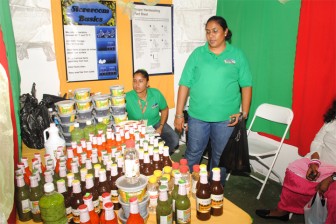Six all-female, agro-processing groups separated by vast expanses of land, water and mountainous terrain are discovering that there is mutual gain to be derived from collaborating even across those distances.
The Women’s Agro-processors Develop-ment Network (WADN) was established one year ago with the support of the Inter-American Institute for Cooperation on Agriculture (IICA) and Voluntary Services Overseas (VSO) to accelerate the individual small ventures located in Regions 1, 2 and 9 with the intention of ensuring that the group members improve their entrepreneurial skills.

Over time and as self-employment has become a necessary option in riverain and hinterland areas, an increasing number of women have been pursuing the option of agro-processing, taking a step up from traditional farming to creating manufactured products out of what is cultivated.
WADN’s members in Region One are the Blue Flame Women’s Group in Hosororo, which produces cocoa sticks, cassava bread, coffee and fruit juices and the Waini Natural which produces a range of crabwood products including oils, soaps, lotions and creams. In Region Two there is the Pomeroon Women’s Agro Processors Association which has become known at Charity and in the Pomeroon River for its fruit juices, pepper sauces, achar, carambola sauce, seasonings and its highly popular virgin coconut oil. In Region Nine, there is Helping Hands Women’s Products Cooperative Society, which manufactures peanut butter, honey and achar and processes cashew nuts and the Aranaputa Processors Friendly Society in the North Rupununi, known for its peanut butter, casareep, cassava bread, peanuts and peanuts products. Rounding out the group is the Region Nine-based Wowetta Women’s Agro-Processors Association which manufactures farine, tapioca and casareep.
This year, the presence of the WADN at GuyExpo offered an encouraging departure from the practice of micro and small rural and hinterland businesses finding their way to the event on their own and returning home with little to show beyond a ‘one-off’ exposure on the biggest marketing stage of their lives.
The relationship between these small commercial enterprises and the international organizations that have brought them together began with an initial collaboration between the VSOs and the respective groups. The VSOs had been working with the groups for several years on an initiative known as the ‘secure livelihood programme’, which was aimed at encouraging small, disadvantaged communities to generate income through viable means available in those communities. Not surprisingly, having already laid a foundation in farming all of them turned to agro-processing.
Simultaneously, IICA was operating an agro-processing programme in Regions One, Two and Nine. The two entities collaborated to identify groups with which they had worked and opted to develop an initiative aimed at their simultaneous advancement.
The network is designed to allow for an ongoing exchange of ideas and technical information among the groups as well as to apply economies of scale in the acquisition of raw materials and equipment, such as containers, for their respective enterprises.
IICA’s local head Dr Maxine Aaron-Parris told Stabroek Business that apart from these advantages that repose in having the groups work together there is also the advantage of seeking out larger urban markets for the products manufactured by the network as a whole. The IICA head said that apart from working through the network to secure a greater collective share of the local market it is hoped that the collaboration among the groups will eventually earn them shares of both the regional and international markets.
The network is run by a board of directors comprising two members of each of the six groups and the board is supported by a VSO-funded network administrator. Discussions are currently underway regarding the creation of an urban storage centre for network products in order to make distribution easier.
Representatives of the network meet quarterly and the locations of the meetings are rotated to allow for visits to each other’s communities. The meetings also serve as a forum for the sharing of information and the refining of the network’s operations.
Aaron-Parris said a stage has been reached where the groups comprising the network are being advised to enter into contracts with farmers in order to minimize the negative impact of price fluctuations for raw materials. Groups at Aranaputa and in the Pomeroon have already entered into such arrangements.
The groups have each realized modest accomplishments in their own right.
The Blue Flame Women’s Group has secured a distributor for its products in Georgetown. The products are marketed under the trading name North West Organics and are sole to some of the leading supermarkets in the city. As is to be expected there are times when demand outstrips supply and this has impacted negatively on what the group says is an available Canadian market.
This year, Waini Naturals made its second appearance at GuyExpo. Though the organisation’s products are popular in the Waini area, the current goal is to secure a reliable urban market. That, until now, remains elusive.
Having encountered difficulties marketing their nuts in the North Rupununi the Aranaputa Processors Friendly Society has benefited from a programme launched by the Ministry of Education for the production of fruit juices, nut butter and cassava bread as snacks for the children attending the Aranaputa Primary School.
The network’s most recent breakthrough has come in the form of an offer from Bounty Supermarket to purchase 125 pounds of peanut butter every month. The product will be available for sale to consumers in Georgetown. Sterling Products Limited has offered to provide sealing and a bar code for the containers. Sterling has offered to make other purchases from the network.
Through the network, the various groups receive certification from the Food and Drugs Department.
During their recent visit to Georgetown to attend GuyExpo the groups comprising the network benefited from the support of IICA and VSO in the designing of labels to enhance the marketing appeal of their products.




